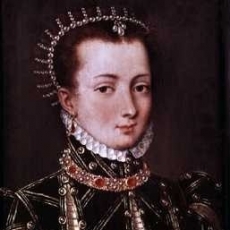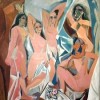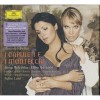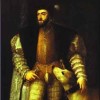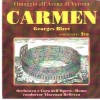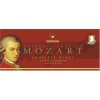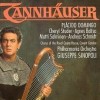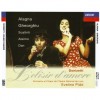Libretto
Anna Bolena is a tragedia lirica, or opera, in two acts by Gaetano Donizetti. Felice Romani wrote the Italian libretto after Ippolito Pindemonte's Enrico VIII ossia Anna Bolena and Alessandro Pepoli's Anna Bolena, both telling of the life of Anne Boleyn. It premiered on December 26, 1830 at the Teatro Carcano, Milan.
The duet "Sul suo capo aggravi un Dio" between Anna (soprano) and Jane Seymour (mezzo soprano) is considered one of the finest in the entire operatic repertoire.
Anna Bolena was performed infrequently during the latter half of 19th century and early 20th century, but it was revived with more frequency in the post-war years. On December 30, 1947, the opera was performed at Gran Teatre del Liceu in Barcelona, celebrating the centennial of this theatre, which opened in 1847 with Anna Bolena. The cast was Sara Scuderi as Anna Bolena, Giulietta Simionato as Jane Seymour and Cesare Siepi as Henry VIII.
In April 1957, the opera was revived at La Scala for Maria Callas in a lavish production directed by Luchino Visconti, and it proved to be one of her greatest triumphs. Similarly it was one of the last new roles performed by Dame Joan Sutherland. Other famous interpreters of the role were Leyla Gencer, Beverly Sills, Montserrat Caballé, Renata Scotto and Edita Gruberova.
Anna Bolena is regularly performed now and there are several recordings of it.
Plot Summary
Act One
Felice Romani’s libretto for Anna Bolena was based only very loosely on historical fact.
Act One, Scene One, takes places at night in the apartments of the Queen at Windsor Castle. Courtiers comment that the queen’s star is setting, because the king’s fickle heart burns with another love. Giovanna (Jane Seymour) enters. Troubled, she wonders why the queen has asked to see her. (“Ella di me, sollecita più dell’usato, ha chiesto.”)
Anna (the queen, Anne Boleyn) enters and notes that people seem sad. (“Si taciturna e mesta mai non vidi assemblea.”) The queen admits being troubled to Giovanna. At the queen’s request, her page Smeton plays the harp and sings to cheer the people present. (“Deh! non voler costringere a finta gioia il viso . . .”) The queen asks him to stop. Unheard by any one else, she says to herself that the ashes of her first love are still burning, and that she is now unhappy in her vain splendor. The queen is unwilling to tell Giovanna what is troubling her. All leave, except Giovanna.
Enrico (Henry VIII) the king enters. Enrico tells Giovanna that soon she will have no rival, that the altar has been prepared for her , that she will have husband, sceptre, and throne. Each leaves by a different door.
Act One, Scene Two, takes place during the daytime in the park surrounding Windsor Castle. Lord Rochefort, Anna’s brother, is surprised to meet Lord Richard Percy, who has been called back to England from exile by Enrico. Percy asks is it true that the Queen is unhappy and that the King has changed. “And does love ever remain content?,” replies Rochefort. Hunters enter. Percy is agitated at the prospect of possibly seeing Anna, who was his first love. Enrico and Anna enter and express surprise at seeing Percy. Enrico does not allow Percy to kiss his hand, but says that Anna has given him assurances of Percy’s innocence. “Ah! do not betray me, o heart!,” says Anna to herself. She still has feelings for Percy. In an aside, Enrico tells Hervey, an officer of the king, to be the spy of every step and every word of Anna and Percy.
Act One, Scene Three, takes place in Windsor Castle in a small room leading into Anna’s apartments. Smeton takes from his breast a locket containing Anna’s portrait and he kisses it. He has stolen it and has come to return it. He hears a sound and hides beyond a screen. Anna and Rochefort enter. Rochefort asks Anna to hear Percy. Then he leaves. Smeton peeps out from behind the screen, but feels that he cannot escape. Percy enters. Percy says that he sees that Anna is unhappy. She tells him that the king now loathes her. Percy says that he still loves her. Anna tell him not to speak to her of love. Before leaving, Percy asks whether he can see Anna again. She says, “No. Never again.” He draws his sword to stab himself, and Anna screams. In the mistaken belief that Percy is attacking Anna, Smeton rushes out from behind the screen. Smeton and Percy are about to fight. Anna faints, and Rochefort rushes in. Just then, Enrico enters and sees the unsheathed swords. Summoning attendants, he says that these persons have betrayed their king. Smeton says that it is not true, and tears open his tunic to offer his breast to the king for slaying if he is lying. The locket with Anna’s portrait falls at the king’s feet. The king snatches it up. “Ecco il tradimento,” “Here is betrayal,” he says. He orders that the offenders be dragged to dungeons. Anna says to herself that her fate is sealed.
Act Two
Act Two, Scene One, takes place in London in an antechamber leading into the rooms where Anna is held prisoner. Guards stand at the door. They note that even Giovanna Seymour has stayed away from Anna. Anna enters with a chorus of ladies, who tell her to place her trust in heaven. Hervey enters and says that the Council of Peers has summoned the ladies into its presence. The ladies leave with Hervey. Giovanna enters, and says that Anna can avoid being put to death by admitting guilt. Anna says that she will not buy her life with infamy. She expresses the hope that her successor will wear a crown of thorns. Giovanna admits that she is to be the successor. Anna tells her to leave, but says that Enrico alone is the guilty one. Giovanna leaves, deeply upset.
Act Two, Scene Two, takes place in the antechamber leading into the hall where the Council of Peers is meeting. Hervey tells courtiers that Anna is lost, because Smeton has talked and has revealed a crime. Enrico enters. Hervey says that Smeton has fallen into the trap. Enrico tells Hervey to continue to let Smeton believe that he has saved Anna's life.
Anna and Percy are brought in, separately. Enrico says that Anna has made love to the page Smeton, and that there are witnesses. He says that both Anna and Percy will dies. Percy says that it is written in heaven that he and Anna are married. They are led away by guards.
Giovanna enters. She says that she does not want to be the cause of Anna's death. Enrico says that she will not save Anna by leaving. Hervey enters and says that the Council has dissolved the royal marriage and has condemned Anna and her accomplices to death. Courtiers and Giovanna ask the king to be merciful. He tells them to leave.
Act Two, Scene Three, takes place at the Tower of London. Percy and Rochefort are together in their cell. Hervey enters and says that the king has pardoned them. They ask about Anna. Hearing that she is to be executed, they choose to be executed also. They leave, surrounded by guards.
In Anna's cell, a chorus of ladies comment on her madness and grief. Anna enters and asks them "Are you weeping?", "Piangete voi?" She imagines that it is her wedding day to the king. Then she imagines that she sees Percy, and she asks him to take her back to her childhood home. ("Al dolce guidami castel natio . . .") Percy, Rochefort, and Smeton are brought in. Smeton throws himself at Anna's feet, and says that he accused her in the belief that he was saving her life. In delirium, Anna asks him why he is not playing his lute. The sound of cannon is heard. Anna comes to her senses. She is told that Giovanna and Enrico are being acclaimed by the populace on their wedding day. Anna says that she does not invoke vengeance on the wicked couple. She faints. Guards enter to lead the prisoners to the block. Smeton, Percy and Rochefort say that one victim has already been sacrificed.





